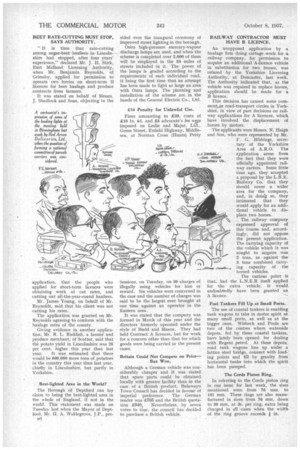BEET RATE-CUTTING MUST STOP, SAYS AUTHORITY.
Page 40

If you've noticed an error in this article please click here to report it so we can fix it.
" It is time that rate-cutting among sugar-beet' hauliers in Lincolnshire had stopped, after four years' experience," declared Mr. J. H. Stirk, Fast Midland Licensing Authority, when Mr. Benjamin Reynolds, of Grimsby, applied for permission to operate two lorries on short-term B licences for beet haulage and produce contracts from farmers.
It was stated on behalf of Messrs. J. Shadlock and Sons, objecting to the application, that the people who applied for short-term licences were obtaining work at cut rates, and cutting out all-the-year-round hauliers.
Mr. James Young, on behalf of Mr. Reynolds, said that his client was not cutting his rates.
The application was granted on Mr. Reynolds agreeing to conform with the haulage rates of the county.
Giving evidence in another application, Mr. R. L. Reddish, a farmer and produce merchant, of Scotter, said that the potato yield in Lincolnshire was 25 per cent. higher this year than last year. It was estimated that there would be 600,000 more tons of potatoes in the country this year than last year, chiefly in Lincolnshire, but partly in Yorkshire.
• Best-lighted Area in the World?
The Borough of Deptford can lay claim to being the best-lighted area in the whole of England, if not in the world. This statement was made on Tuesday last when the Mayor of Deptford, Mr. H. A. Waldegrove, J.P., pre
sided over the inaugural ceremony of improved street lighting in the borough.
Osira high-pressure mercury-vapour discharge lamps are used, and when the scheme is completed over 2,000 of them will be employed in the 50 miles of streets included in it. The power of the lamps is graded according to the requirements of each individual road, it being the first time that an attempt has been made to light so large an area with Osira lamps. The planning and installation of the scheme are in the hands of the General Electric Co., Ltd.
154 Penalty for Unlawful Use.
Fines amounting to £39, costs of £10 is, 4d. and £5 advocate's fee we imposed on Leslie and Major, Ltd., Green Street, Enfield Highway, Middlesex, at Norman Cross (Hunts) Petty Sessions, on Tuesday, on 39 charges of illegally using vehicles for hire or reward. Six vehicles were concerned in the case and the number of charges was said to be the largest ever brought at one time against an operator in the Eastern area.
It was stated that the company was formed in March of this year and the directors formerly operated under the style of Budd and Mason. They had held Contract A licences, but for work for a concern other than that for which goods were being carried in the present cases.
Britain Could Not Compete on Price— But Won.
Although a German vehicle was considerably cheaper and it was stated that spare parts could be obtained locally with greater facility than in the case of a British product, Bulawayo Town-Council has decided in favour of imperial preference. The German tender was £765 and the British quota
tion £940., Nevertheless, by seven votes to four, the council has decided to purchase a British vehicle. RAILWAY CONTRACTOR MUST HAVE B LICENCE.
An unopposed application by a haulage firm doing cartage work for a railway company, for permission to acquire an additional A-licence vehicle in substitution for two horses, was refused by the Yorkshire Licensing Authority, at Doncaster, last week. The Authority indicated that, as the vehicle was required to replace horses, application should be made for a .13 licence.
This decision has caused some comment.in road-transport circles in Yorkshire, in view of past decisions on railway applications for A licences, which have involved the displacement of horses by motors.
The applicants were Messrs. N. Haigh and Son, who were represented by Mr.
F. G. Bibbings, secretary of the Yorkshire Area of A.R.O. The application arose from the fact that they were officially appointed railway carters. Some little time ago, they accepted a proposal by the L.N.E. Railway Co. that they should cover a wider area for the company. and, in doink so, they intimated that they would apply for an additional . vehicle to displace two horses.
The railway company expressed approval of this course and, accordingly, did not oppose the present application. The carrying capacity of the vehicle which it was sought to acquire was 2 tons, as against the
3 tons combined carrycaeteraeLe ing capacity of the horsed vehicles.
The curious point is that, had the L.N.E.R itself applied for the extra vehicle, it would undoubtedly have been granted an A licence.
Fuel Tankers Fill Up at Small Ports.
The use of coastal tankers is enabling tank wagons to take in motor spirit at many small ports, as well as at the bigger ones. Wisbech and Poole are two of the centres where waterside depots, fed by these coastal tankers, have lately been opened for dealing with Regent petrol. At these depots, road tank wagons line up under a lattice steel bridge, connect with loading points and fill by gravity from horizontal tanks into which the spirit has been pumped.
The Cords Piston Ring.
In referring to the Cords piston ring in our issue for last week, the sizes mentioned were from 76 mm. to 101 mm. These rings are also manufactured in sizes from 76 mm. down to 50 mm. at 3s. per ring, extra being charged in all cases when the width of the ring groove exceeds in.




























































































